Teeth veneers are thin porcelain or composite resin shells that are applied to the front surfaces of teeth. They are used to improve the appearance of a variety of different teeth imperfections, such as discoloration, chipped or broken teeth, gaps between teeth, and misaligned or uneven teeth. Veneers are designed to mimic the appearance of natural teeth and can be used to create a more cohesive and aesthetically pleasing smile.
They are a popular cosmetic dental treatment and can be made from porcelain, composite, or resin materials. Veneers are relatively durable and can last for several years with proper care. This article explores their benefits, costs, and the procedure to get them.
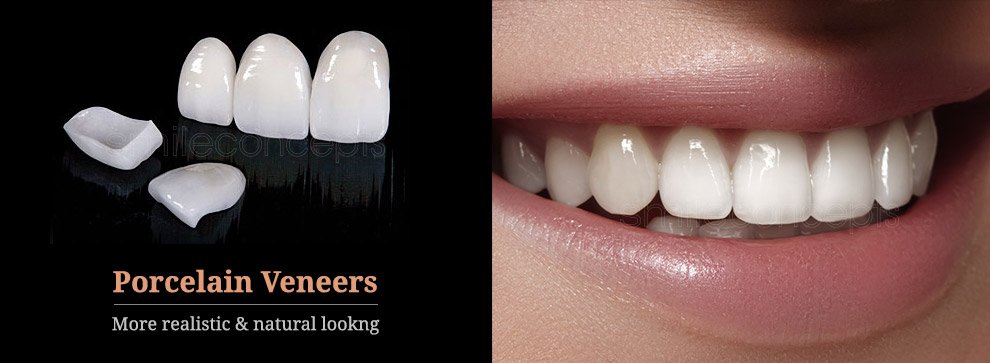
Cosmetic Veneers Before and After Pictures
Meet April who was very please with her porcelain veneers result.
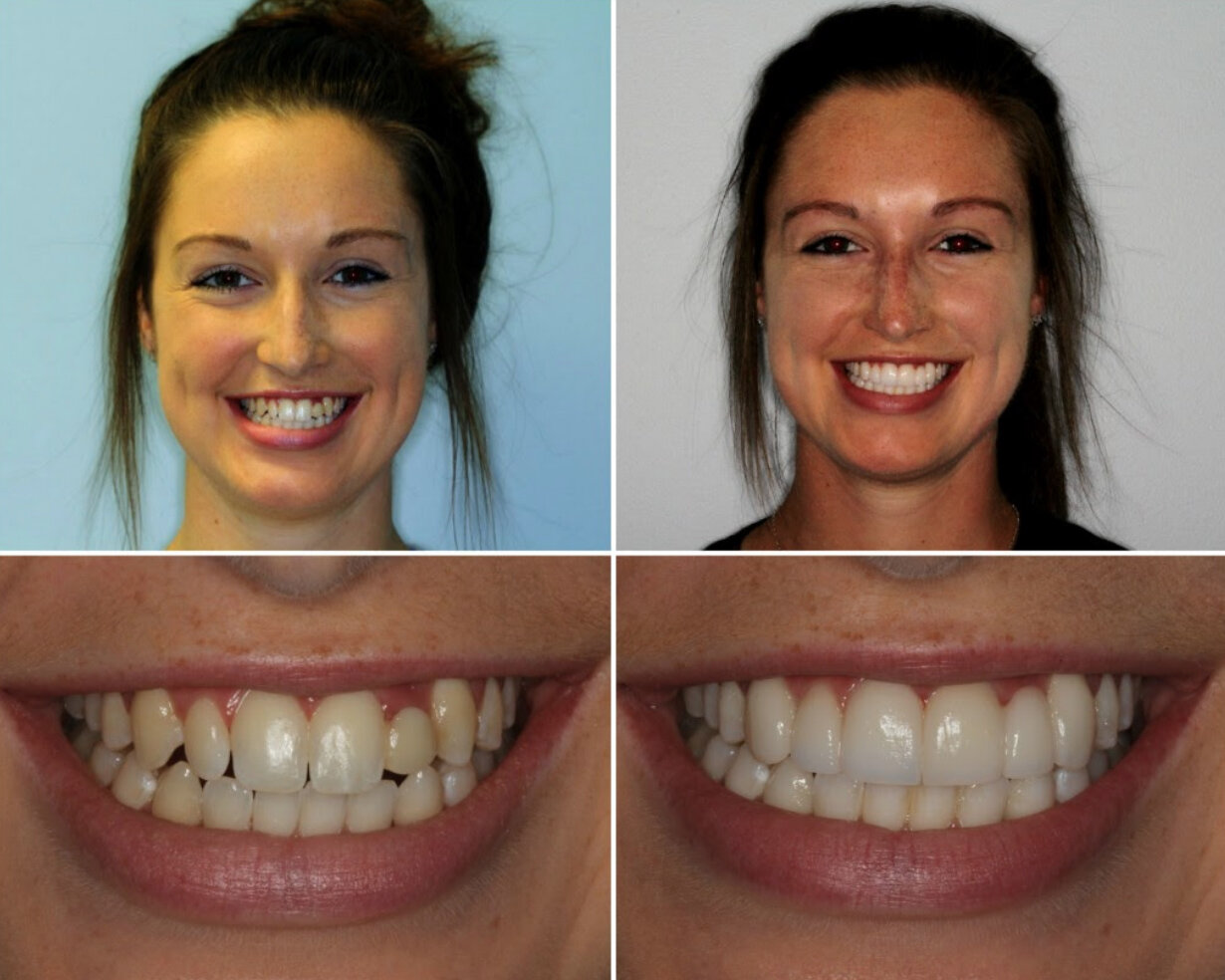
Rochelle before and after cosmetic teeth veneers.
Key Points about Dental Veneers
- Porcelain veneers are custom-made, thin, tooth-colored shells designed to cover the front surface of teeth, addressing various dental issues such as broken, misshapen, or discolored teeth, as well as gaps and crooked teeth.
- The procedure for getting porcelain veneers involves three main steps: an initial consultation to assess suitability, tooth preparation requiring some enamel removal, and the final placement where veneers are bonded to the teeth for a natural look.
- Porcelain veneers offer several benefits including a natural appearance, durability, and resistance to stains, with a lifespan of 10 to 15 years or more with proper care; however, the cost ranges from $925 to $2,500 per tooth depending on various factors.
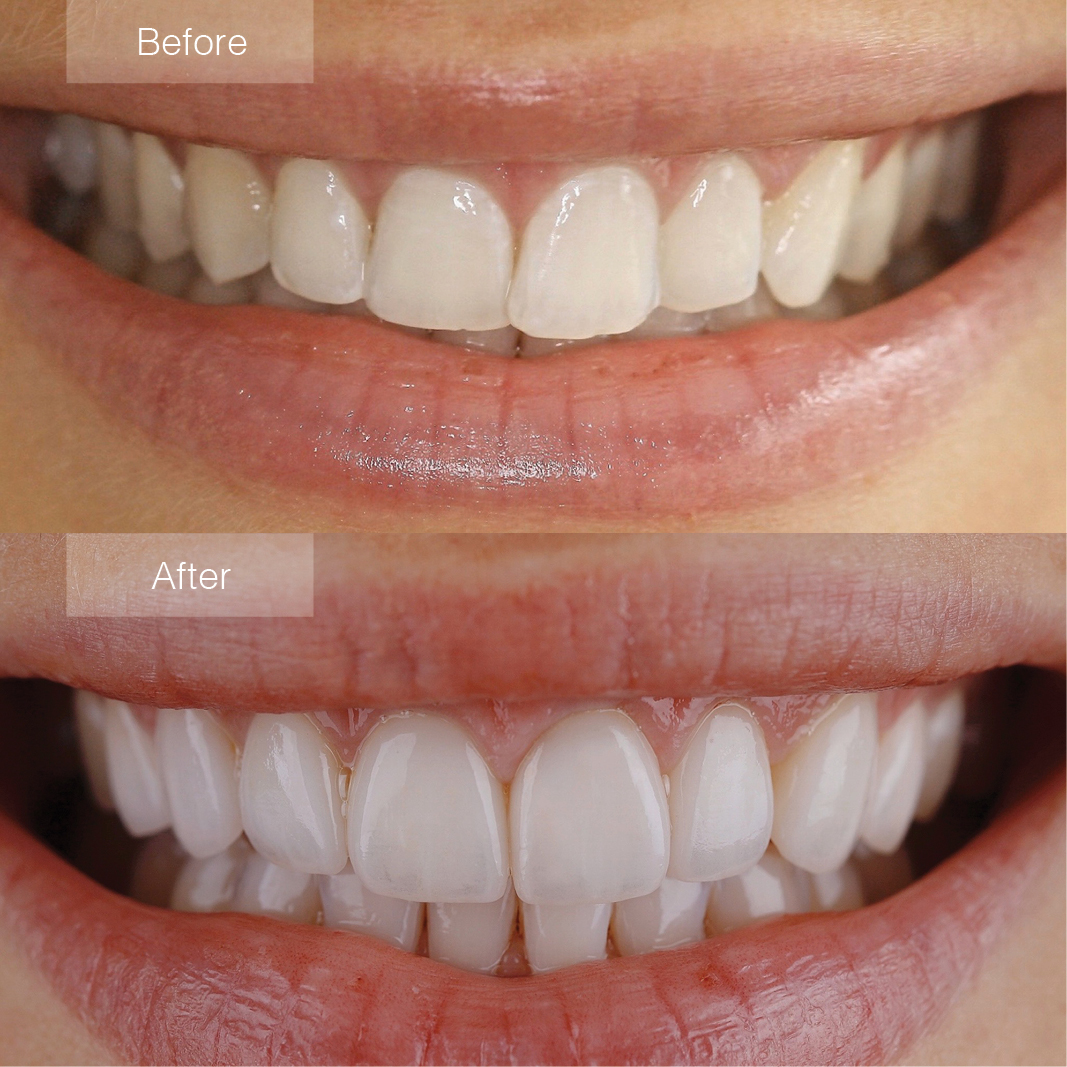
Introduction
Whether due to life’s little accidents or the passage of time, our natural tooth enamel can begin to show signs of wear. Dental veneers, particularly those crafted from porcelain, provide an elegant cloak for such blemishes, transforming a smile with minimal intrusion.
Beyond merely covering up small cosmetic issues, they promise a renewed sense of self and a return to a time when smiling was done with ease and confidence.
Composite Resin Veneers vs Porcelain Veneers
Composite and porcelain veneers are both types of dental veneers that can be used to improve the appearance of the teeth and achieve a more aesthetically pleasing smile. However, there are some key differences between the two types of veneers:
- Material: Composite veneers are made from a composite resin material, while porcelain veneers are made from a ceramic material. Porcelain veneers look better, last a lot longer, but they are also a lot more expensive.
- Appearance: Porcelain veneers are typically more realistic in terms of color, translucency, and texture, as they are made from a ceramic material that closely mimics the appearance of natural teeth. Composite veneers, on the other hand, are less realistic in appearance and may not be as effective at mimicking the look of natural teeth.
- Durability: Porcelain veneers tend to be more durable than composite veneers, as they are made from a harder and more resistant material. Composite veneers are more prone to chipping and staining and may not last as long as porcelain veneers.
- Cost: Porcelain veneers tend to be more expensive than composite veneers, as they are made from a more advanced and expensive material.
Ultimately, the best type of veneers for a particular patient will depend on their individual circumstances and the specific goals they have for their smile. A dentist will be able to assess the patient’s teeth and discuss the pros and cons of each type of veneer, as well as recommend the best option based on the patient’s needs and budget.
Who Should Get Teeth Veneers?
- People with teeth discoloration or dark colored teeth: Veneers can be used to cover up tooth stains that are resistant to traditional whitening treatments.
- Cases with fractured, broken, chipped or worn teeth: Veneers can be used to repair small cracks and defects in teeth.
- Individuals with spaces in between teeth: Veneers can be used to fill in small gaps between teeth, creating a more cohesive and aesthetically pleasing smile.
- People with crooked, poorly aligned or uneven teeth: Veneers can be used to correct minor misalignment issues, or issues where the teeth are not in the correct positions, creating a more symmetrical, smooth and attractive smile line. Sometimes this problem favors doing braces or Invisalign prior to getting veneers.
In addition to cosmetic benefits, veneers can also have functional benefits. For example, veneers can be used to protect teeth that have been damaged by decay or unsightly cracks. They can also be used to improve the function of teeth that have been worn down or are otherwise not functioning properly in the bite.
It is important to note that veneers are not suitable for all patients and are not a good option for those with severe dental issues or decay. In these cases, other treatment options may be more appropriate such as crowns, root canals or implants.
When is it Best to Do Invisalign Before Getting Veneers?
In many cases it is better to do Invisalign before getting veneers. This is because Invisalign can better align and position your teeth, so they are in a better position before getting veneers. When teeth are in a better position the result for your veneers will be better. And it will reduce the likelihood of complications related to misaligned teeth, such as uneven wear, bite issues and TMJ problems.
Getting Invisalign before doing veneers offers several advantages:
- Better foundation for veneers: Well-aligned teeth provide a more stable foundation for veneers, ensuring they fit properly and last longer.
- Less tooth reshaping and drilling of existing tooth structure: In some cases, teeth need to be reshaped a lot to accommodate veneers. With a properly aligned smile, there will be less tooth reshaping and more of your natural tooth structure will be preserved.
- Improved oral health: Invisalign treatment can improve oral health by making it easier to clean your teeth and reducing the risk of gum disease and tooth decay.
What do Dental Veneers Cost?
The cost of dental veneers varies depending on several factors, including the type of veneers being used, the location of the dental practice, the skill of the dentist, quality of materials, and the specific treatment plan. On average, porcelain veneers tend to be the most expensive option, followed by composite veneers, and then resin veneers.
According to the American Dental Association, the average cost of porcelain veneers ranges from $925 to $3,500 per tooth. This means that the total cost of a full set of veneers can range from $9,250 to $35,000 and possibly more depending on how many teeth are getting veneers.
Composite veneers tend to be less expensive than porcelain veneers, with an average cost of $250 to $1,500 per tooth. The total cost of a full set of composite veneers can range from $2,500 to $15,000. Resin veneers are the least expensive option, with an average cost of $250 to $1,000 per tooth. The total cost of a full set of resin veneers can range from $2,500 to $10,000.
It is important to note that these estimates are only rough guidelines and that the actual cost of dental veneers may vary depending on the individual circumstances of the patient. It is always a good idea to discuss the cost of treatment with a dentist before proceeding with treatment. Many dentists offer financing options to help make treatment more affordable.
Porcelain Teeth Veneers Before and After
What are the Steps in Getting Teeth Veneers?
- Initial consultation: During the first visit to the dentist, the patient will discuss the desired outcomes of the treatment and the dentist will assess the patient’s teeth to determine if veneers are a suitable option. The dentist will also take impressions of the patient’s teeth, which will be used to create the custom veneers.
- Preparation of the teeth: The next step in the process is the preparation of the teeth. This involves the removal of a small amount of enamel from the front surfaces of the teeth to make room for the veneers. The amount of enamel removed will depend on the thickness of the veneers being used. Once the teeth have been prepared, the dentist will place temporary veneers on the teeth to protect them while the permanent veneers are being made.
- Fabrication of the veneers: The impressions of the patient’s teeth are then sent to a dental lab, where the porcelain veneers are fabricated. This process typically takes several weeks to complete.
- Final fitting: Once the veneers have been made, the patient will return to the dentist for a final fitting. The dentist will ensure that the veneers fit properly and make any necessary adjustments.
- Placement of the veneers: The final step in the process is the placement of the veneers. The dentist will cement the veneers to the teeth, completing the process.
It is important to note that the process of getting porcelain veneers may vary slightly from one patient to the next depending on the specific treatment plan and the individual needs of the patient. It is always a good idea to discuss the process in detail with the dentist before proceeding with treatment.
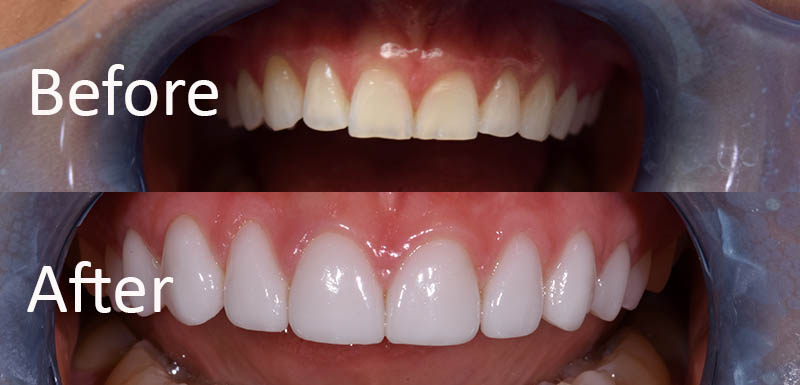
Do Teeth Veneers Feel Thicker than Natural Teeth?
The thickness of porcelain veneers can vary depending on the specific treatment plan and the individual needs of the patient. In general, porcelain veneers are typically thinner than traditional crowns, which are used to restore damaged or decayed teeth. Most people do not say that teeth veneers feel thicker than natural teeth. Often times the texture feels different, such as smoother than natural teeth. If the dentist does not remove enough material to compensate for the thickness of the veneers, than they can feel thick, but not removing enough tooth structure to allow room for the veneer is considered to be a technical error.
Most porcelain veneers are between 0.5 and 0.7 millimeters thick, which is about the same thickness as a contact lens. This thickness is typically sufficient to provide the necessary strength and support to the veneers while still maintaining a natural appearance.
However, it is important to note that porcelain veneers may feel slightly thicker than natural teeth due to the fact that a small amount of enamel is removed from the front surfaces of the teeth to make room for the veneers. This can slightly alter the way the teeth feel and may take some time to get used to.
It is always a good idea to discuss the thickness of the veneers with the dentist before proceeding with treatment. The dentist will be able to recommend the best thickness for the patient based on their specific needs and goals.
What do Teeth look like under Dental Veneers?
The appearance of teeth under veneers depends on the type of veneers being used and the condition of the teeth prior to treatment. In general, teeth under veneers will appear smoother and more uniform in shape and color compared to the original teeth. This is because the veneers are designed to mimic the appearance of natural teeth and can be customized to achieve the desired shade and shape.
However, it is important to note that the appearance of teeth under veneers will not be exactly the same as natural teeth. This is because a small amount of enamel is typically removed from the front surfaces of the teeth to make room for the veneers. Usually the teeth under the veneers will appear darker and more yellow in appearance. Also the tooth surface may be roughened because a rough surface provides a better surface for bonding the veneer. Most often the teeth under the veneers will not look attractive because there was a reason for the veneers in the first place.
All Teeth Veneers are not Created with Equal Quality
The quality of porcelain veneers can vary depending on a number of factors, including the materials used, the skill and experience of the dental lab, and the techniques used during the manufacturing process.
In general, higher quality porcelain veneers will be made from more advanced materials and will be manufactured using more precise techniques. These veneers will typically be stronger and more durable, and will be able to mimic the appearance of natural teeth more effectively.
On the other hand, lower quality porcelain veneers may be made from cheaper materials and may be manufactured using less precise techniques. These veneers may not be as strong or durable and may not be as effective at mimicking the appearance of natural teeth.
It is important to choose a reputable dental lab and dentist when getting porcelain veneers in order to ensure that the best quality veneers are used. It is also a good idea to ask to see before and after photos of the dentist’s work and to ask about the warranties and guarantees offered on the veneers.
Select a Skilled Cosmetic Dentist for Porcelain Veneers
Not all dentists are equally good at doing teeth veneers. The skill and experience of the dentist can have a significant impact on the quality of the veneers and the overall outcome of the treatment.
It is important to choose a dentist who has experience and expertise in placing dental veneers. A good dentist will be able to assess the patient’s teeth and discuss the desired outcomes of the treatment, as well as provide guidance on the best veneer material and design to achieve these outcomes. They will also be able to prepare the teeth properly and place the veneers accurately and carefully to ensure the best possible result.
To find a good dentist for teeth veneers, it is a good idea to do some research and ask for recommendations from friends, family, and other dental professionals. It is also a good idea to ask to see before and after photos of the dentist’s work and to ask about their qualifications and experience in placing veneers. It may also be helpful to visit the dental office and meet with the dentist in person to ask any questions and get a sense of their approach to treatment.
Can Teeth Veneers Fall Off?
It is possible for teeth veneers to come off, although this is typically rare if the veneers are placed and cared for properly. Veneers are typically cemented to the front surfaces of teeth using a dental adhesive, and they should stay in place unless they are subjected to excessive force or wear and tear.
There are a few factors that can increase the risk of veneers coming off, including:
- Poor oral hygiene: Veneers can become loose or come off if the teeth and gums are not well-maintained. It is important to brush and floss regularly and to see a dentist for regular cleanings and checkups to ensure that the teeth and gums are healthy.
- Habits such as grinding or clenching the teeth: These habits can put excessive force on the veneers, potentially causing them to loosen or come off. Wearing a mouthguard at night can help to protect the veneers from these forces.
- Accidents or trauma: Veneers can come off if the teeth are subjected to sudden trauma, such as a fall or a blow to the face.
If a veneer does come off, it is important to see a dentist as soon as possible to have it repaired or replaced. Ignoring a missing veneer can result in further damage to the tooth and may lead to additional dental problems.
How Long do Teeth Veneers Last?
On the average, teeth veneers will last 10-15 years with proper care. However, some veneers may last longer or shorter depending on the dentist, the patient and many quality control factors. For example, porcelain veneers may last longer than composite resin veneers due to their durability. But if you have poor oral hygiene or a bad bite, teeth veneers may only last 3-5 years. Additionally, not all dentists are created equal. Getting teeth ready for veneers is a technically challenging task. The quality of cement for porcelain veneers makes a big difference. Perfect work by the dentist and the worlds best veneer can fall off without proper bonding and superior quality resin cement.
Why Not to Get Dental Veneers?
While veneers can be an effective cosmetic treatment, there are several reasons why you may want to consider not getting teeth veneers. Teeth veneers are very expensive, and cause permanent damage to your teeth. And dental veneer procedures are unpleasant and sometimes painful and scary.
- High Costs of Cosmetic Dentistry Procedures
- Veneers are expensive and will need to be redone every 10-15 years
- There may be other better treatment alternatives such as Invisalign and teeth whitening
- Irreversible damage done to teeth
- Potential procedure complications such as a tooth dying and needed a root canal.
What are Porcelain Veneers?
Porcelain veneers are the epitome of cosmetic dentistry’s art and science, a fusion of dental craftsmanship and aesthetic vision. These thin, tooth-colored shells are meticulously crafted to cover the front surface of teeth, seamlessly blending with your natural teeth to enhance your smile’s appearance. Traditional porcelain veneers, as well as their counterparts, composite veneer, made of composite resin materials, are tailored to address a variety of dental concerns, including:
- Broken teeth
- Misshapen teeth
- Discolored teeth
- Gaps between teeth
- Crooked teeth
Porcelain dental veneer offers a durable and natural-looking solution to these dental issues.
The journey to a perfect smile with porcelain dental veneers involves a personalized process, one that considers the unique contours of your teeth and your cosmetic aspirations. This blog post provides an insight into the various aspects of porcelain veneers, including their benefits, costs, and the comprehensive procedure of their application, to give you a thorough understanding of this transformative cosmetic procedure.
The Procedure for Getting Porcelain Veneers
Embarking on the porcelain veneer journey is a transformative experience that unfolds in three distinct steps: the initial consultation, the careful preparation of your teeth, and the final, triumphant placement of your veneers. The process is a delicate blend of meticulous planning and precise execution, designed to ensure that your new smile meets every one of your expectations.
Initial Consultation
The initial consultation serves as the launchpad for your smile makeover. It’s an opportunity for a heart-to-heart with your dentist, where your dental history is reviewed, and your smile aspirations are shared. During this meeting, your dentist will:
- Evaluate the health of your teeth
- Discuss the possibility of porcelain veneers as a suitable cosmetic procedure for you
- Listen to any specific desires or concerns you might have
This ensures that the final outcome aligns perfectly with your dream smile.
This is also the moment when your dentist will explain the process in detail, addressing any questions you might have. This step forms the basis for a successful transformation, offering clarity and setting the stage for what’s to come.
Tooth Preparation
During the tooth preparation stage, your teeth are readied to accommodate their new porcelain veneers. This phase involves a subtle reshaping of your natural teeth to accommodate the veneers. A thin layer of enamel is delicately trimmed away to ensure a flawless fit and a natural look. While some may worry about discomfort, the process is typically performed with local anesthesia, making it a comfortable experience.
Once the enamel is removed, your dentist will take an impression of your teeth, capturing every ridge and valley to ensure the custom veneers are a perfect match. If there’s a wait time while your final veneers are being crafted in the dental laboratory, temporary veneers may be placed to protect the prepared teeth and maintain your smile’s appearance.
Final Placement
The climax of the porcelain veneer process is the final placement. Your dentist will carefully position the veneers, making precise adjustments to achieve the perfect alignment and bite. You’ll be asked to perform a series of movements with your mouth to ensure the fit is comfortable and functional. Once satisfied, the chosen shade of dental cement is applied, and the veneers are securely bonded to your teeth using a blue light, which catalyzes the adhesive process for a secure and enduring attachment.
This moment signifies more than the mere completion of a dental procedure; it marks the revelation of your transformed smile. With the final adjustments made and the bonding complete, you’re ready to step out into the world with newfound confidence. Your veneers are now an integral part of your smile, ready to face the world with you.
Types of Dental Veneers
Dental veneers come in a diverse palette of options, each offering unique benefits to meet a range of needs and preferences. Some popular options include:
- Traditional porcelain veneers: These stand out for their strength and natural appearance.
- Composite resin veneers: These provide a quicker and often more cost-effective solution. They can also be sculpted directly onto the teeth in a single visit, offering immediate results.
- Lumineers: These are ultra-thin veneers that require minimal to no tooth preparation.
It’s important to consult with your dentist to determine which type of veneer is best suited for your specific needs and goals.
On the other side of the spectrum are no-prep veneers like DURAthin® and Lumineers®, which boast a minimally invasive approach. These veneers require little to no enamel removal, preserving more of the natural tooth structure and offering a reversible option for those hesitant to commit to the more permanent traditional veneers.
DURAthin® veneers, in particular, are known for their ultra-thin design, allowing them to be applied directly to the teeth without any enamel removal, making them an appealing choice for those looking to enhance their smile without altering the natural tooth.
Benefits of Porcelain Veneers
Porcelain veneers offer more than just a superficial cosmetic improvement; they signify a radical shift in smile aesthetics. They offer a natural appearance that rivals the translucency and gloss of natural teeth, ensuring your enhanced smile is indistinguishable from the real thing. But the benefits extend beyond the surface. Porcelain is a robust material that resists stains from coffee, wine, and tobacco use, maintaining the brightness of your smile over time.
Moreover, the durability of porcelain veneers is remarkable. They are built to withstand the rigors of daily life and, with proper care, are less likely to chip compared to their resin-based counterparts. This makes them a less invasive and more aesthetic alternative to dental crowns, especially in cases where teeth are overcrowded but structurally sound.
Caring for Porcelain Veneers
Maintaining the luster of your porcelain veneers is akin to caring for your natural teeth, with a few extra considerations for longevity. Here are some tips to keep in mind:
- Regular brushing with a nonabrasive toothpaste and a soft-bristled toothbrush is key.
- Flossing is important to prevent plaque accumulation at the veneer margins.
- Avoid hard foods that could jeopardize the integrity of your veneers, like biting into ice or hard candies.
By following these tips, you can ensure the longevity of your porcelain veneers.
Frequent dental checkups are vital for maintaining your veneers in their best state. These appointments allow your dentist to:
- Professionally clean and inspect your veneers, ensuring they remain securely bonded and free from tartar buildup.
- Incorporating a fluoride mouth rinse into your daily routine can also fortify the enamel underneath your veneers.
- Steering clear of sugary foods and drinks will minimize the risk of plaque formation.
Cost of Porcelain Veneers
Investing in porcelain veneers equates to investing in a bright future for your smile. The porcelain veneers cost can vary widely in the realm of cosmetic dentistry, typically ranging from $925 to $2,500 per tooth. Several factors play into this price spectrum, including the quality of the materials used, the expertise of the cosmetic dentist, and the location of the dental practice.
The number of veneers you decide to get will naturally have a direct impact on the total cost. A full set will command a higher price, but the transformation can be nothing short of dramatic. It’s a decision that balances the immediate financial outlay against the long-term benefits of a radiant and enduring smile.
Porcelain Veneers vs. Dental Crowns
Porcelain veneers and dental crowns each have unique roles in the field of dental restoration. Veneers act as a facade, covering the front of the tooth to mask aesthetic flaws, whereas a dental crown encapsulates the entire tooth, providing both structural reinforcement and cosmetic improvement. Veneers are the go-to for quick cosmetic enhancements, while crowns are the solution for teeth that have been weakened or compromised.
Crowns, typically lasting between 5 to 15 years, offer a balance of durability and function, often coming with a higher price tag but also a greater likelihood of insurance coverage due to their restorative nature. In comparison, veneers are less about restoration and more about rejuvenation, offering a thinner and less invasive approach to a smile upgrade.
Combining Porcelain Veneers with Other Cosmetic Procedures
The quest for the ideal smile frequently extends beyond just porcelain veneers. For a comprehensive smile makeover, veneers can be artfully combined with teeth whitening, dental bonding, or even orthodontics to address a wider array of cosmetic concerns. This melding of treatments allows for a holistic approach, correcting not just individual imperfections but enhancing the entire aesthetic of your smile.
An ortho-veneer approach, for instance, corrects alignment issues with orthodontics before veneers are applied for the finishing touch. This strategy ensures a smile that’s not only visually pleasing but also functionally sound, offering a tailored solution to each unique dental narrative.
How Long Do Porcelain Veneers Last?
The allure of porcelain veneers is not just in their immediate transformational effect but also in their enduring quality. With consistent care, these porcelain marvels can enhance your smile for 10 to 15 years, while certain ceramic types can last even up to 20 years or longer. Regular brushing, flossing, and professional dental check-ups are the pillars of maintaining your veneers’ integrity over the years.
However, even the finest porcelain can’t withstand neglect. To prolong the lifespan of your veneers, they must be treated with the same care you would give to your natural teeth. Regular dental appointments every six months allow for early detection of any issues that could compromise your veneers, ensuring they remain a lasting emblem of your commitment to oral health.
Are Porcelain Veneers Permanent?
Porcelain veneers are often described as a permanent solution to cosmetic dental concerns. The permanence comes from the need to alter the natural tooth structure, removing a thin layer of enamel to accommodate the veneer. Once this enamel is removed, there’s no going back—the tooth will always require a veneer or an alternative form of protection.
This irreversible action is a crucial decision in one’s dental journey, symbolizing a commitment to a future where veneers are a constant part of your smile’s narrative. It’s a testament to the transformative power of porcelain veneers and the lasting impact they have on those who choose them.
Summary
In the landscape of cosmetic dentistry, porcelain veneers stand out as a beacon of transformation. They offer a harmonious blend of aesthetic pleasure and practical resilience, providing a solution that not only elevates the smile but also instills a sense of self-assurance that resonates through every facet of life. As we’ve explored, from their inception to their diligent care, veneers are a commitment—a commitment to beauty, to health, and to the brilliance of a smile that endures.
Frequently Asked Questions
If you have minor cosmetic dental issues like chips, cracks, or discoloration, porcelain veneers may be right for you. Your dentist can assess your dental health and discuss your cosmetic goals to determine if veneers are the best option for you.
Porcelain veneers are highly resistant to staining, but it’s important to maintain good oral hygiene and regular dental checkups to prevent decay on the underlying tooth.
Porcelain veneers are often considered cosmetic and may not be covered by dental insurance. It’s important to verify your coverage with your insurance provider.
To extend the life of your porcelain veneers, maintain good oral hygiene by brushing with a nonabrasive toothpaste, flossing daily, and avoiding hard foods. Regular dental checkups and cleanings are also important.
If a porcelain veneer chips or falls off, it’s important to contact your dentist immediately for their advice on the best course of action, which may involve replacing the veneer. Delaying treatment could lead to further damage.
 2918 Spencerville Rd, #124Burtonsville, MD 20866
2918 Spencerville Rd, #124Burtonsville, MD 20866  (301) 421 1118
(301) 421 1118 
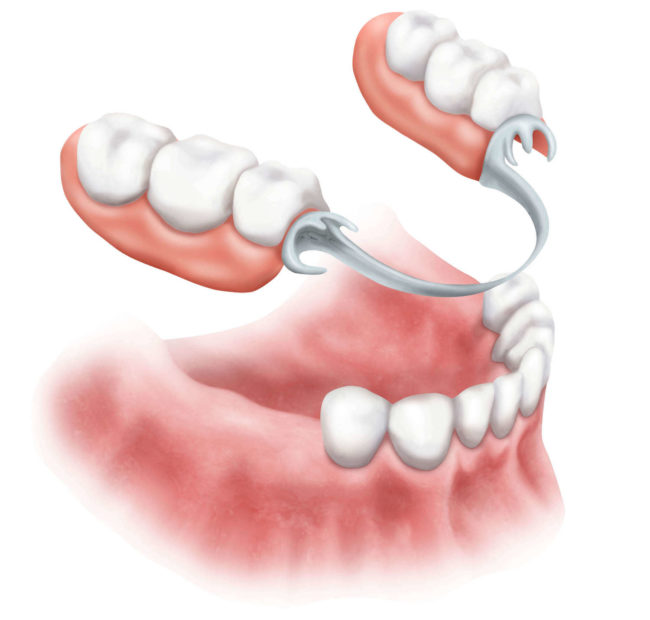
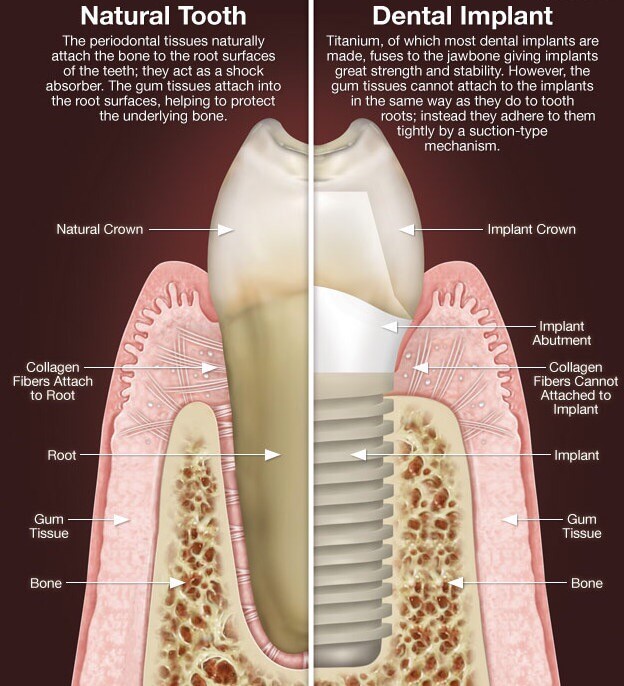
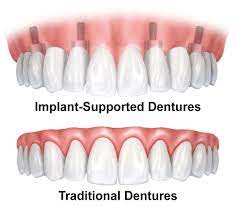

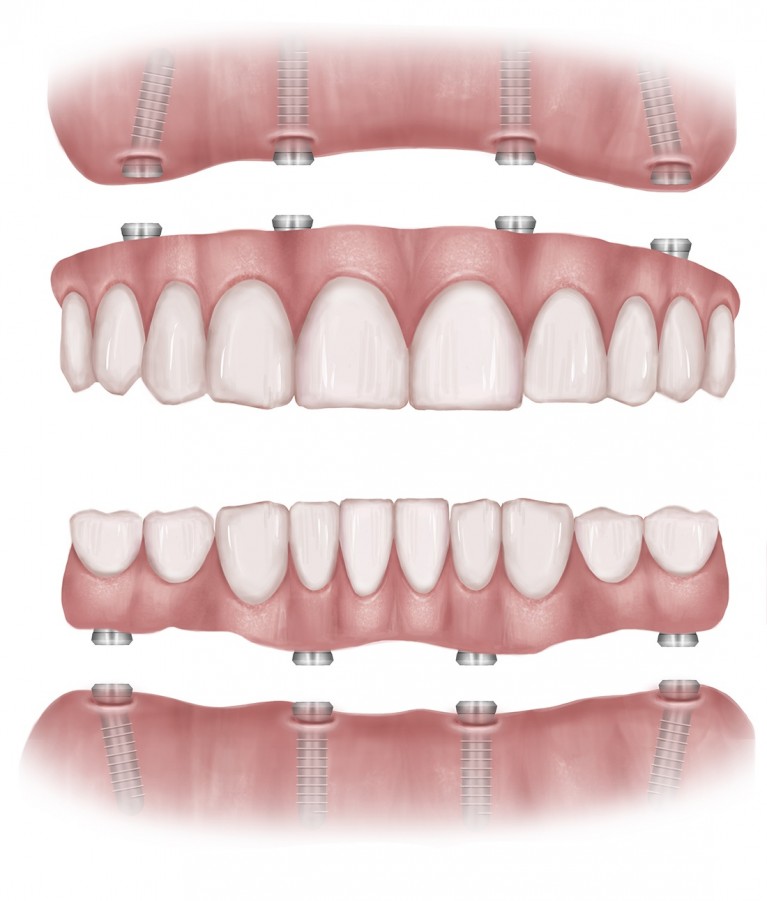
0 Comments
No comments yet. Be the first to comment!
Comments are closed.